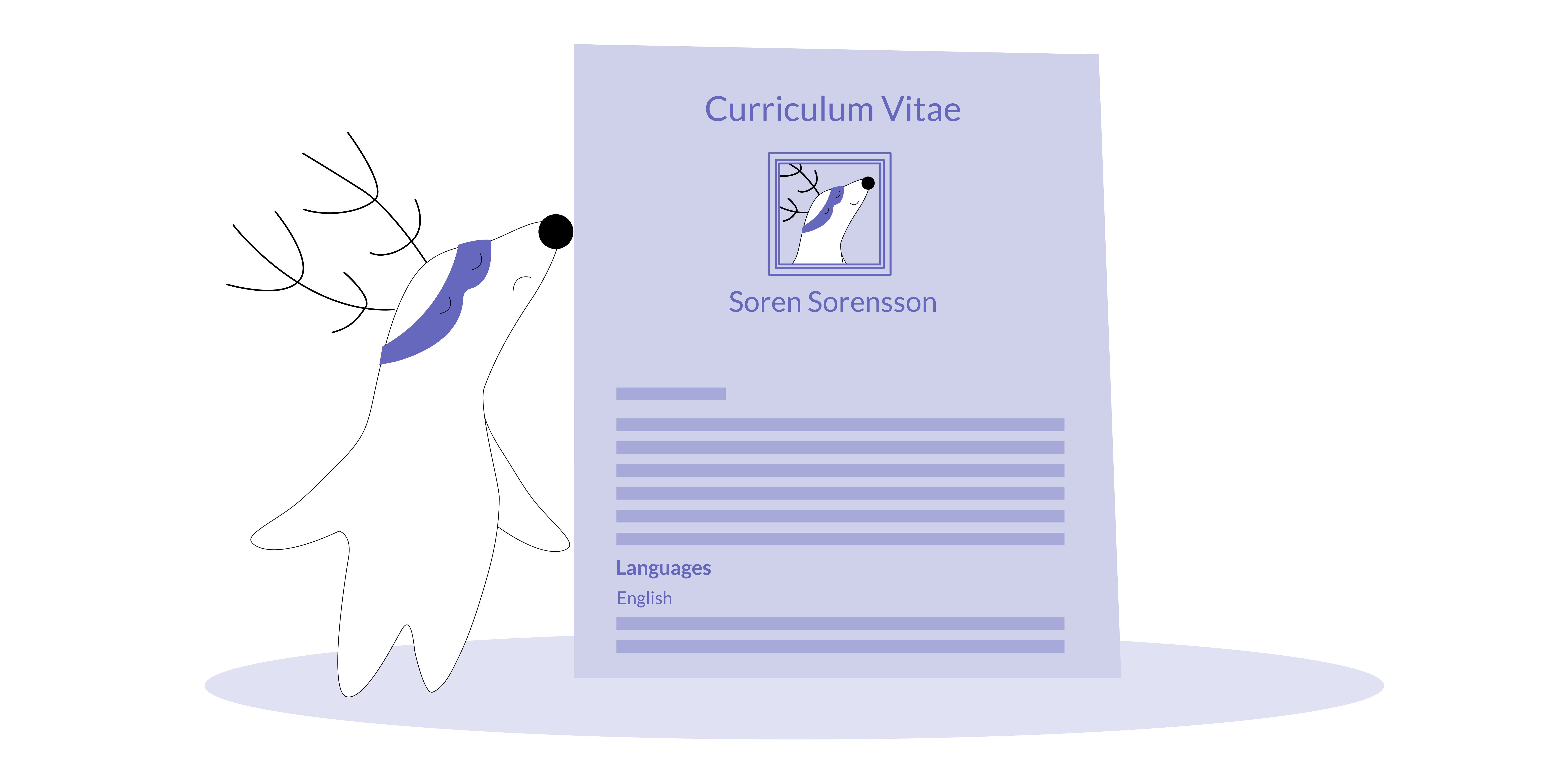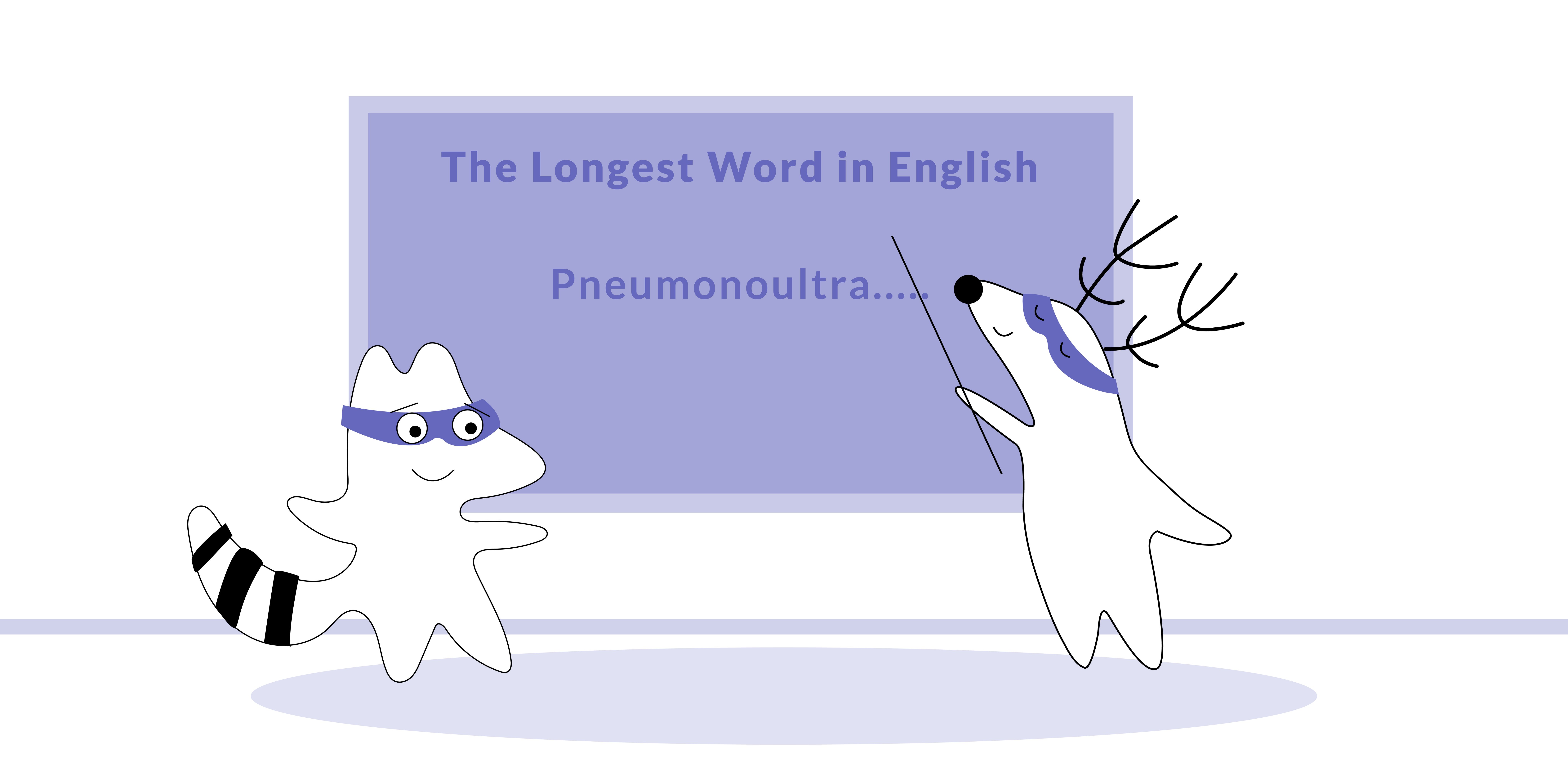
In the realm of linguistics, words are the fundamental units that carry meaning and make communication possible. But, did you know that in every language, there are certain words that defy the norm by their sheer length? Some span numerous syllables and characters, turning the simple act of pronunciation into a challenging endeavor.
In the English language, the title of the longest word goes to Pneumonoultramicroscopicsilicovolcanoconiosis — a word so long that it might take you a moment to get your tongue around it.
Not to be outdone, many other languages, including Sanskrit, Vietnamese, and German, also boast their own lexical giants. In this article, we'll delve into these lengthy words, exploring their meanings, translations, and the fascinating histories behind their creation.
Learn English with Langster
Pneumonoultramicroscopicsilicovolcanoconiosis — The Longest Word in English
Pneumonoultramicroscopicsilicovolcanoconiosis, which appears in the Oxford English Dictionary, is a 45-letter word that refers to an obscure lung disease caused by prolonged inhalation of fine silica dust.
The term was first coined in the early 1930s by the president of the National Puzzlers' League, Everett M. Smith, as a fake long word to stump his fellow word game enthusiasts. However, the term eventually found its way into medical dictionaries, cementing its place as the longest English word.
While it may seem like a string of random syllables put together, each component of Pneumonoultramicroscopicsilicovolcanoconiosis has a specific meaning:
- pneumono refers to the lungs,
- ultra means beyond,
- microscopic indicates something that is too small to be seen with the naked eye,
- silico stands for silica or silicon dioxide (a common component of sand),
- volcano points to fire and ash,
- coniosis denotes a medical condition.
Put together, the word becomes a medical term that describes a lung disease caused by inhaling very fine silica particles that can potentially be found in volcanic ash.
Methionylthreonylthreonylglutaminylalanyl…isoleucine — The Longest Word... Ever?
While Pneumonoultramicroscopicsilicovolcanoconiosis is no doubt a mouthful, it may not actually be the longest word in existence.
In fact, according to the Guinness World Records, the title of the longest word goes to Methionylthreonylthreonylglutaminylalanyl...isoleucine — yes, a word with an ellipsis — a chemical name for a human protein titin that is astonishing 189,819 letters long!
If you want to see the entire word, you can do so here. It is so lengthy that it would take over three hours to pronounce! Thankfully, this complicated word can also be abbreviated as "Methionylthreonyl...isoleucine," which is still far from being short and sweet.
Scientific names can turn into really monstrous words — in the case of this one, proteins are named by combining the names of all of the individual amino acids used to form them — but it kind of takes all the fun out of this question.
Floccinaucinihilipilification — The Longest Non-Technical Word
While Methionylthreonylthreonylglutaminylalanyl...isoleucine may be the longest word ever created, it doesn't exactly roll off the tongue.
For those looking for a more manageable long word to impress their friends with, there's always Floccinaucinihilipilification — a 29-letter term that means the act of estimating something as valueless.
Ironically enough, this word is so rarely used in an actual conversation that it itself can be estimated as valueless.
Supercalifragilisticexpialidocious — The Longest Fictional Word
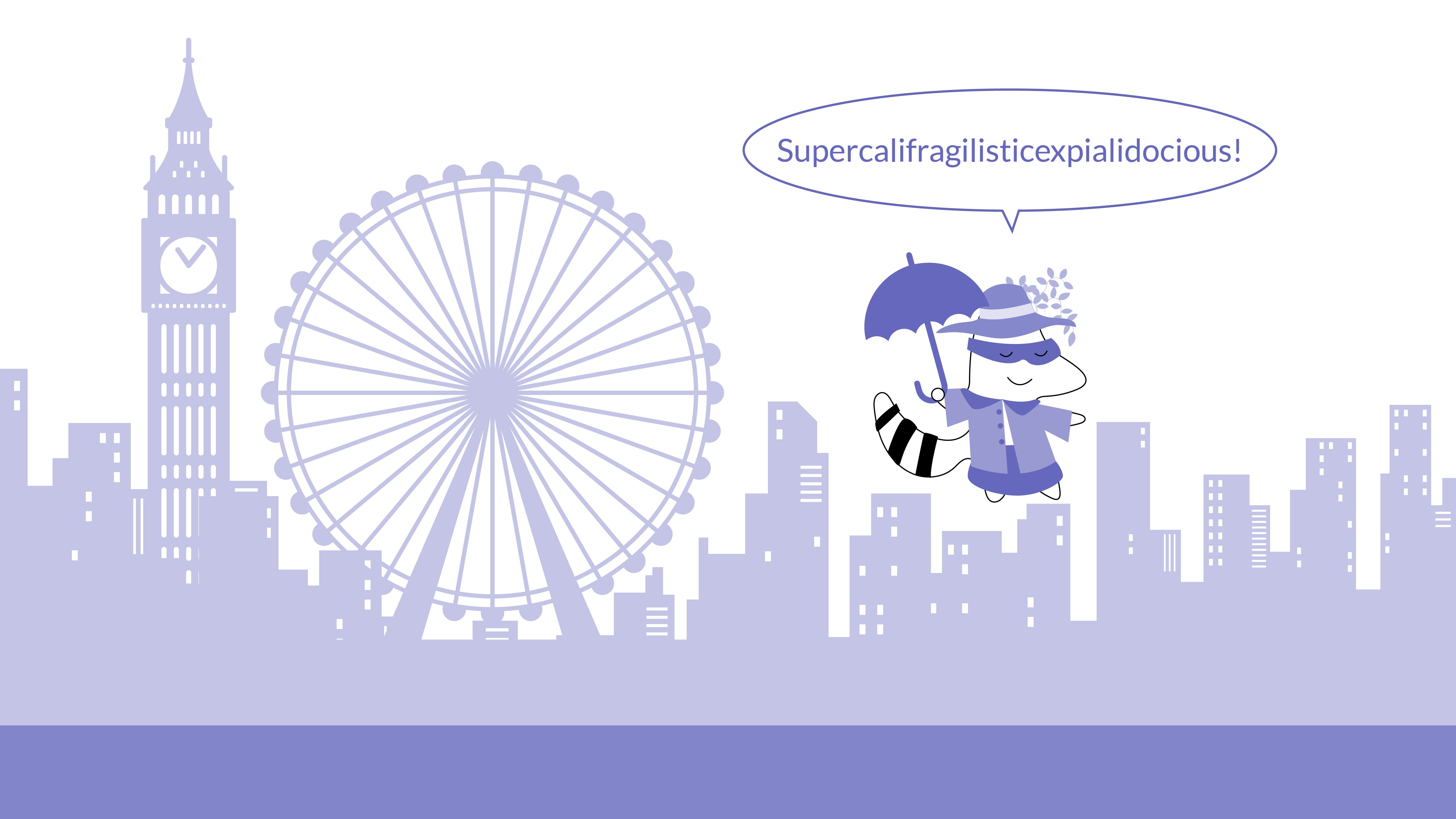
Made famous by the 1964 Disney musical film Mary Poppins, Supercalifragilisticexpialidocious is a word that has become known worldwide for its catchy tune and playful meaning.
The made-up term has no specific meaning other than being a fun and memorable way to describe something extraordinary. According to the movie, it is defined as "something to say when you have nothing to say."
This 34-letter word is a prime example of a "portmanteau" word, which combines parts of two or more words to create a new one.
Scraunched — The Longest One-Syllable Word
In contrast to the long words above, Scraunched stands out as a word that is both short and long at the same time. At 10 letters, it may not seem like much, but what makes this word unique is that it is considered the longest one-syllable word in English.
The word means to crumple or crunch something with a loud noise.
निरन्तरान्धकारित-दिगन्तर-कन्दलदमन्द-सुधारस-बिन्दु-सान्द्रतर-घनाघन-वृन्द-सन्देहकर-स्यन्दमान-मकरन्द-बिन्दु-बन्धुरतर-माकन्द-तरु-कुल-तल्प-कल्प-मृदुल-सिकता-जाल-जटिल-मूल-तल-मरुवक-मिलदलघु-लघु-लय-कलित-रमणीय-पानीय-शालिका-बालिका-करार-विन्द-गलन्तिका-गलदेला-लवङ्ग-पाटल-घनसार-कस्तूरिकातिसौरभ-मेदुर-लघुतर-मधुर-शीतलतर-सलिलधारा-निराकरिष्णु-तदीय-विमल-विलोचन-मयूख-रेखापसारित-पिपासायास-पथिक-लोकान्
Impressive, right? Wait till you hear the whole story.
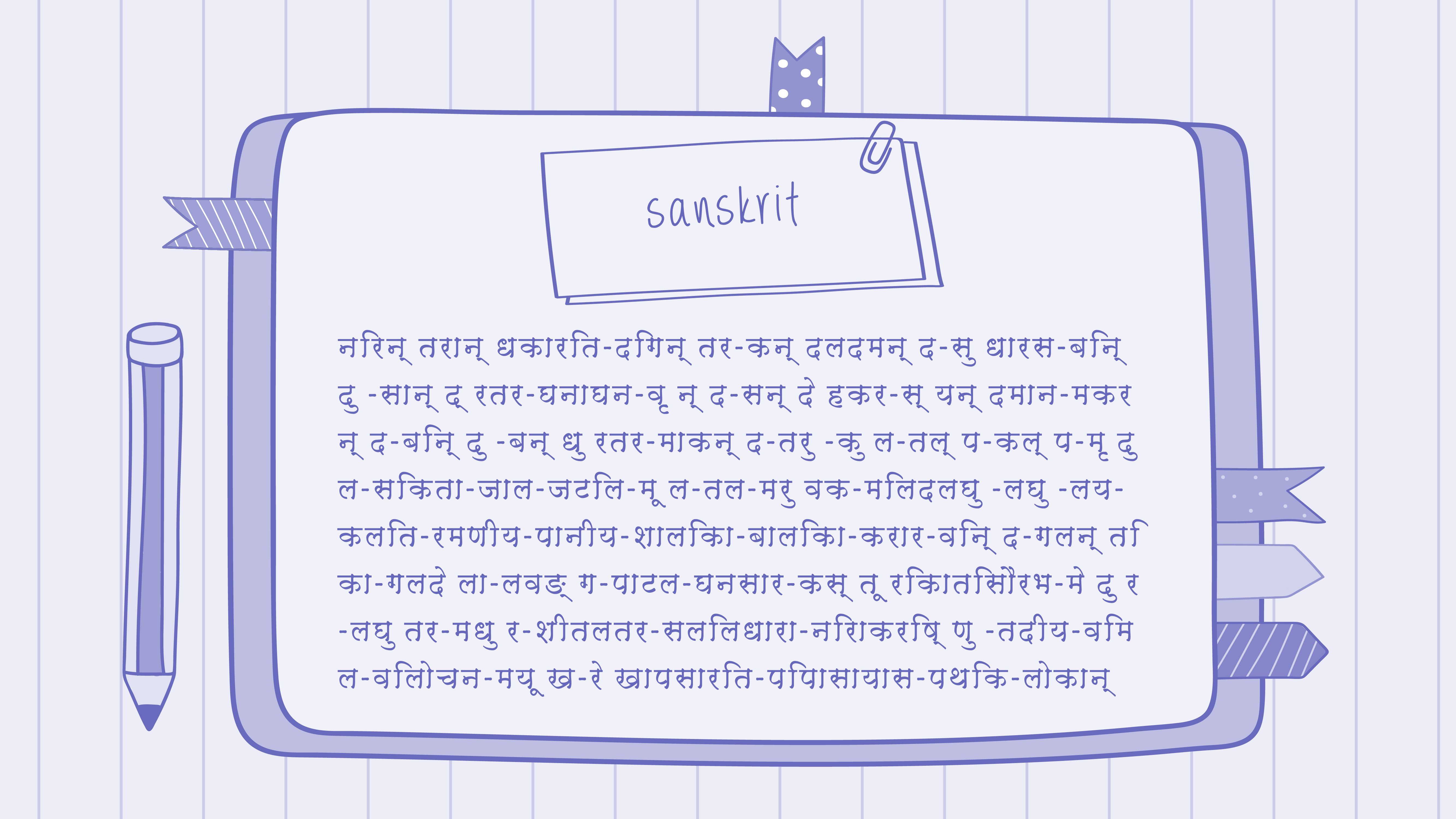
This Sanskrit word, consisting of 195 characters (428 when transliterated into the Roman writing system), was first documented in the Varadāmbikā Pariṇaya Campū by Tirumalāmbā in 1970.
Often cited as the longest word recorded in literature, its intricate meaning paints a vivid picture of the natural beauty of the Tamil Nadu region of India. The translation is a genuine poetic outpouring:
“In it, the distress, caused by thirst, to travellers, was alleviated by clusters of rays of the bright eyes of the girls; the rays that were shaming the currents of light, sweet and cold water charged with the strong fragrance of cardamom, clove, saffron, camphor and musk and flowing out of the pitchers (held in) the lotus-like hands of maidens (seated in) the beautiful water-sheds, made of the thick roots of vetiver mixed with marjoram, (and built near) the foot, covered with heaps of couch-like soft sand, of the clusters of newly sprouting mango trees, which constantly darkened the intermediate space of the quarters, and which looked all the more charming on account of the trickling drops of the floral juice, which thus caused the delusion of a row of thick rainy clouds, densely filled with abundant nectar.”
Rindfleischetikettierungsüberwachungsaufgabenübertragungsgesetz — The Longest German Word
In the German language, it is not uncommon for words to be compounded together.
However, one word, in particular, stands out above the rest – Rindfleischetikettierungsüberwachungsaufgabenübertragungsgesetz. With 63 characters, this word holds the Guinness World Record for being the longest German word.
It was first used in the official title of a food labeling law passed by the state of Mecklenburg-Western Pomerania in 1999. The word is a combination of several words, with each component representing a specific task or responsibility related to the monitoring and regulation of meat labeling.
In English, it roughly translates to "beef labeling supervision assignment transfer law."
λοπαδοτεμαχοσελαχογαλεοκρανιολειψανοδριμυποτριμματοσιλφιοκαραβομελιτοκατακεχυμενοκιχλεπικοσσυφοφαττοπεριστεραλεκτρυονοπτοκεφαλλιοκιγκλοπελειολαγῳοσιραιοβαφητραγανοπτερύγων

According to the ancient Greek playwright Aristophanes, also referred to as the Father of Comedy, this Ancient Greek word was coined as a comical way to mock the overly extravagant names given to food dishes in his time.
With a staggering 183 characters, it is considered one of the longest words in the Greek language and possibly also one of the longest words ever used in literature.
In transliteration to the Latin alphabet, this long word appears as Lopadotemachoselachogaleokranioleipsanodrimhypotrimmatosilphiokarabomelitokatakechymenokichlepikossyphophattoperisteralektryonoptekephalliokigklopeleiolagoiosiraiobaphetraganopterygon.
The word is made up of various food items, such as:
- lopado (a type of fish),
- temacho (seasoning),
- selacho (shark meat),
- galaeo (milk).
The rest of the word includes descriptive terms like cranium, tongue, and wing. The full translation is "a soup made from all the bits of fish that fall off during frying, mixed with wheat and honey." Talk about a mouthful!
Pinakanakakapagngitngitngitngitangpagsisinungasinungalingan — The Longest Word in Tagalog
In the Tagalog language of the Philippines, Pinakanakakapagngitngitngitangpagsisinungasinungalingan holds the record for being the longest published word.
At 56 letters, it is a compound word that means "lying that causes the most extreme anger," making it quite a mouthful to say.
Nghiêng — The Longest Vietnamese Word
The word Nghiêng (which means "inclined" or "to lean"), with just seven letters, holds the honor of being the longest word in the Vietnamese language. Interestingly, it also claims the title of being the shortest longest word that exists.
However, it's worth noting that Nghiêng may be more accurately described as a single morpheme rather than a stand-alone word. This is because Vietnamese is considered an "isolating language" that doesn't traditionally employ prefixes and suffixes to form new words, as many other languages do.
Instead, Vietnamese combines multiple small words to create nuances in meaning.
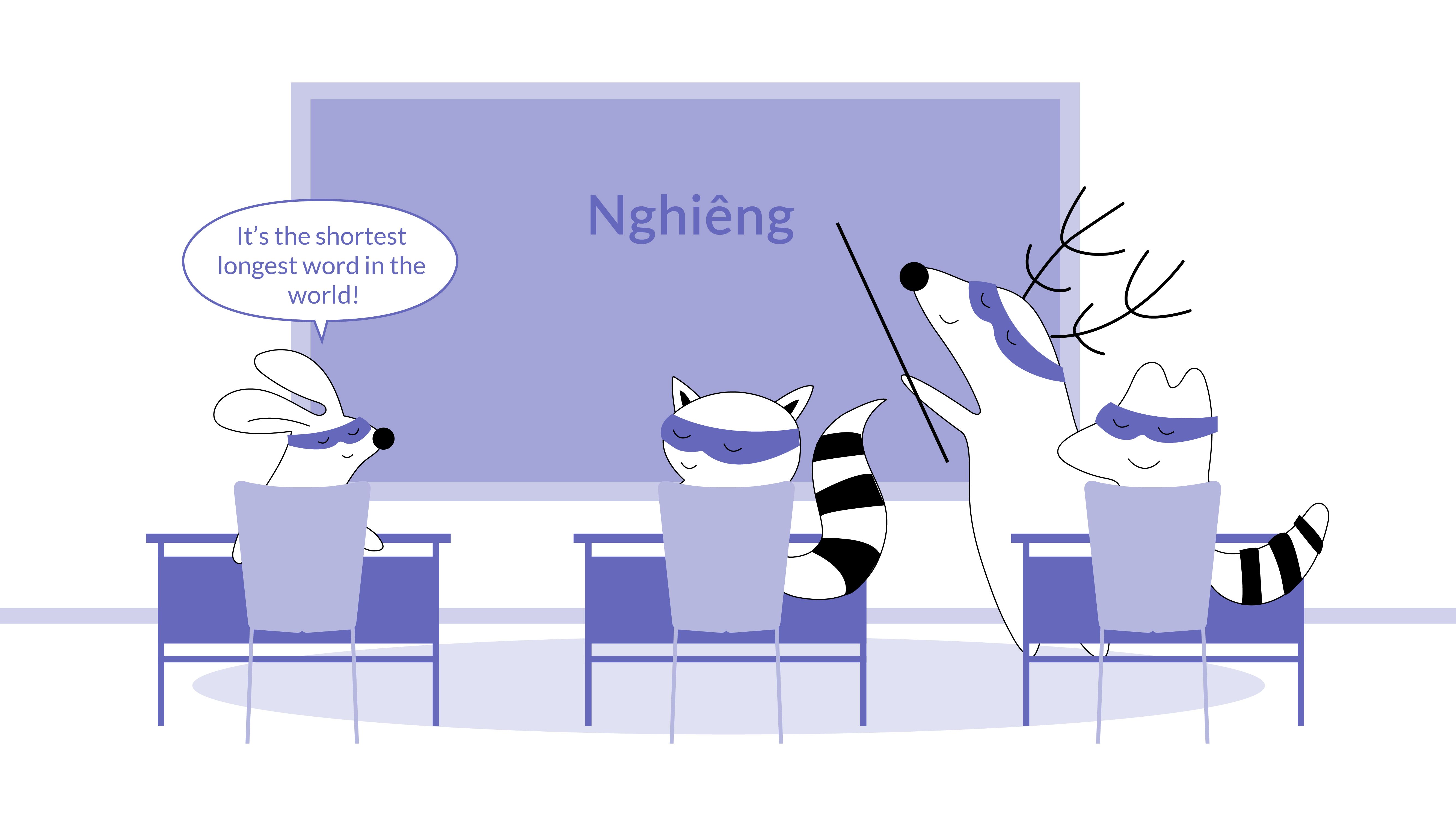
The Bottom Line
While these words may seem daunting to pronounce and remember, they all have fascinating histories that make them stand out. From fictional words in movies to tongue-twisting terms in ancient languages, each one showcases the richness and diversity of language.
So, the next time someone challenges you with the "longest word," you'll be ready to impress with your newfound knowledge!
Keep learning, and keep exploring — the world of language is waiting for you! Let's continue to expand our vocabulary and dive into rich stories with Langster, no matter how long or short they may be.
Learn English with Langster









